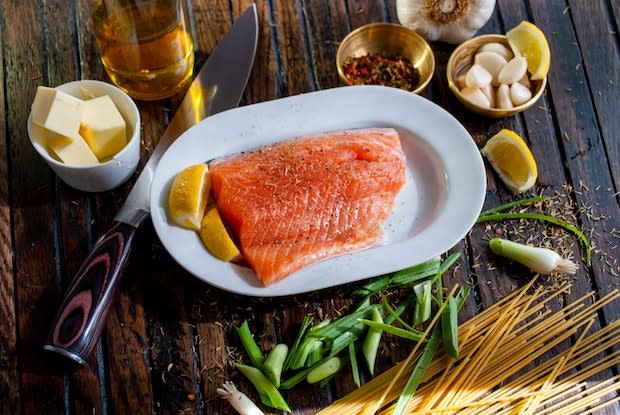Table of Contents
GERD Overview
Living with gastroesophageal reflux disease (GERD) can be disruptive to your everyday life. GERD occurs when stomach acid flows back into the esophagus and causes irritation. Over time, this acid reflux can cause severe complications in the stomach and esophagus. If acid reflux is not controlled with lifestyle changes, you may need medications like Nexium (esomeprazole), Protonix (pantoprazole), Prevacid (lansoprazole), or metoclopramide.
GERD can lead to several unpleasant symptoms, some of which are worse at night. Some common symptoms of GERD can include:
- Difficulty swallowing
- The sensation of a lump in the throat
- Chest pain
- Regurgitation of food
- Chronic cough
- New or worsening asthma
- Disrupted sleep
- Laryngitis [1]

Almost everyone will experience acid reflux at some point in their life. Typically, these symptoms will go away on their own, but they may linger and occur several times a week. For some, GERD can be genetic, and due to a malfunction in the lower esophageal sphincter (LES), but for others, lifestyle choices can result in GERD symptoms. Read on to learn more about a proper diet to improve your GERD condition. [1]
Avoid These Foods
Everyone has their specific triggers for GERD. Some common heartburn triggers may cause the esophageal sphincter to relax and delay the digestive process. Foods that are high in fat, salt, or spice cause acid reflux and GERD symptoms. Some common culprits can include:
- Fatty meats like bacon and sausage
- Cheese
- Pizza
- Fast food
- Fried food
- Potato chips and processed snacks
- Citrus fruits
- Tomato-based sauces
- Peppermint
- Carbonated beverages
- Chocolate
This list involves many foods, but you do not have to eliminate them from your diet. If you have mild GERD symptoms, you should eat these foods in moderation and eat small frequent meals instead of bigger, heavier meals. [2]
Lean Proteins
As mentioned above, fatty meats can cause several GERD symptoms. Fatty foods cause the LES to relax, allowing more stomach acid to back up into the esophagus. Fatty foods also delay stomach emptying, so it may help incorporate lean proteins into your diet instead. Protein is essential in every diet and a primary building block for the body. Protein allows the body to create and repair tissue and is essential in the body's growth and healing.
If you are experiencing GERD due to obesity, lean proteins can also aid in weight loss. Protein can help the body rid itself of fat instead of lean muscle mass. The recommended daily intake of protein for adult men is 56 grams a day and 46 grams a day for women. Some lower-fat proteins can include: Most people have a negative dietary association with carbohydrates. Yes, overeating carbohydrates may be unhealthy for your diet and health, but some carbs can benefit your diet. There are some good sources of carbs that can add fiber to your diet and fill you up for long periods. Eating healthy fiber can keep you full and prevent you from overeating. Some healthy forms of carbohydrates can include: All foods fall somewhere on the pH scale, which is an indicator of acid levels. Foods that have a low pH level are more likely to cause acid reflux. The stomach has a very acidic pH of 1.35-3.5, which breaks down the foods you eat. Foods that are similar to the acidic level of your stomach will increase your chance of acid reflux. Foods that are slightly alkaline or basic have a pH of about 7.4. Eating foods of a higher (alkaline or basic) pH can offset strong stomach acid and prevent GERD symptoms. Common alkaline foods can include: Along with the incorporation of these foods in your diet, there are several habits you can take on to improve your symptoms as well. Some helpful tips can include: Avoid eating before bed: When you eat, stomach acid increases to digest food. If you lay down after eating, the LES may become relaxed and allow stomach acid to travel up the esophagus. A reclined position can increase GERD symptoms, so you should avoid eating a full meal three to four hours before bed. Keep good posture while eating: Your GERD symptoms may improve if you keep a straight posture while eating. If you slouch while eating or eat while lying down, you may inhibit the body's digestive abilities. Standing up and walking around after a meal can also improve digestion. Chew gum: Chewing gum has also been shown to improve digestion and GERD symptoms. When you chew gum, your mouth produces more saliva, which can prevent the lower esophageal sphincter from relaxing. This extra saliva also reduces the amount of acid in the esophagus. [4] The content in this article is intended for informational purposes only. This website does not provide medical advice. In all circumstances, you should always seek the advice of your physician and/or other qualified health professionals(s) for drug, medical condition, or treatment advice. The content provided on this website is not a substitute for professional medical advice, diagnosis, or treatment.
Complex Carbohydrates
Alkaline Foods

Other Dietary Tips
